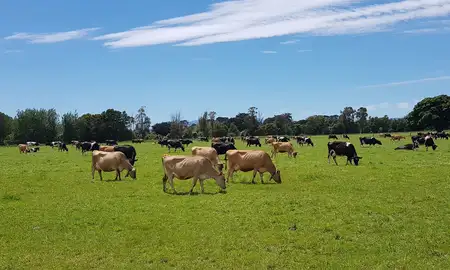
The publicly accessible courses, adapted to consider changing governmental legislation, are now available, with a new intake in February 2024.
Freshwater quality is an important issue for many New Zealanders, and Te Kunenga Ki Pūrehuroa Massey University supports this with their publicly accessible online short courses. The courses, adapted to consider changing governmental legislation, are now available, with a new intake in February 2024.
During 2020, in response to declining freshwater quality across the country, the Government announced the Essential Freshwater Package. Freshwater is a critical resource that we cannot live without, and neither can many of our native insect, fish, bird and plant species. Our freshwater is under increasing pressure from drinking and irrigation water supply schemes, loss of wetlands, climate change and run-off from urban and rural settings that can cause contamination.
A critical part of the Essential Freshwater Package is the Freshwater Farm Plans (FWFPs). FWFPs are a tool for farmers and land managers to identify the strengths and risks of their land and farming systems and help target resources towards actions that will achieve better freshwater and business outcomes. These plans will help farmers continue to improve local waterways and are being progressively phased in across the country, beginning with the Waikato and Southland regions.
Massey runs Intermediate and Advanced Fresh Water Farm Planning courses to provide rural advisors and farmers with the skills and knowledge required to produce high-quality FWFPs. The Government finalised FWFP regulation in June 2023 and these courses are updated yearly to be consistent with changes in rules and regulations.
Course Co-ordinator Associate Professor Lucy Burkitt and Lecturer Dr Callum Rees from Massey’s Farmed Landscapes Research Centre (FLRC) within the School of Agriculture and Environment deliver the courses and complete research on strategies to reduce the impacts of agricultural management on freshwater.
"The strength of our training course is that students gain an understanding of how water and contaminants move from the farm to freshwater. This is critical if we want to effectively target actions to achieve the FWFP and Essential Freshwater objectives of reducing risks to freshwater and bringing waterways and ecosystems to a healthy state within a generation," Dr Burkitt says.
“Now that the Government have finalised the regulations, our courses and templates have been updated to reflect the new requirements. This means anyone taking our courses learns the relevant knowledge and skills required to develop comprehensive FWFPs and that they receive up-to-date, constructive feedback on how to improve their plans”, she adds.
“Our courses focus on understanding farm systems and physical farm resources so that participants can identify their own farm’s strengths and risks, and suggest sensible, realistic actions to help target resources towards achieving good freshwater and business outcomes. This includes understanding the local river or waterway context and inherent vulnerabilities associated with a particular farm,” Dr Rees says.
The courses complement other professional development courses Massey offers, such as New Zealand Farm Systems, Intermediate and Advanced Sustainable Nutrient Management, Agricultural Greenhouse Gas Emissions and Management and Farm Dairy Effluent, providing well-rounded training for participants to become certified Freshwater Farm Planners.
“The added bonus is you can use the credits from our courses towards a postgraduate qualification,” Dr Rees says.

Massey staff discussing soil properties on Massey’s No.4 Dairy farm in the Manawatū.
Massey’s environmental professional development courses
The Intermediate FWFP course is delivered through online distance learning and is intended to be flexible. It consists of approximately 100 hours of online study, including self-timed learning activities, the development of a desktop Freshwater Farm Plan (FWFP) which is assessed, and the support of live video conference presentations and tutorials.
The Advanced FWFP course equates to approximately 150 hours of work and is designed for blended delivery, involving three days on dairy, arable and sheep and beef farms and participants developing three FWFPs that are assessed. The development of each plan is well supported by live video conference tutorials.
The courses attract a range of students, including consultants, farmers, regional council staff and policy and regulation staff.
Courses offer the opportunity to:
Upskill in Freshwater Farm Planning
- Develop high level skills
- Align with certification requirements
- Gain postgradate tertiary level qualification credits
- Intermediate Course
11 weeks, online delivery - Advanced Course
14 weeks, online delivery
Upskill in Sustainable Nutrient Management and Greenhouse Gas Management
- Develop high level skills
- Gain postgradate tertiary level qualification credits
- Intermediate Course
12 weeks, online delivery - Advanced Course in Sustainable Nutrient Management
20 weeks, online delivery - Greenhouse Gas Course
10 weeks, online delivery
Details of all short courses are listed on the Farmed Landscapes Research Centre website.
Related news
Workshop will focus on challenges and solutions within New Zealand’s primary production industry
Diverse solutions for efficient land, water and nutrient use is the theme of this year’s Farmed Landscapes Research Centre workshop.

Annual FLRC workshop a success despite irregular format
This year's Farmed Landscapes Research Centre workshop looked a little different than previous years, with the entirety of the three-day programme being held virtually due to COVID restrictions.
